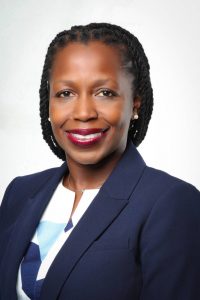 Advocates for Basic Legal Equality (ABLE)’s new Executive Director, Makiedah Messam, brings diverse and impressive experiences to her service at ABLE. Having worked domestically and internationally in both nonprofit and government, Messam brings decades of experience in public interest law to ABLE, a Foundation-funded legal aid serving northwest and west-central Ohio.
Advocates for Basic Legal Equality (ABLE)’s new Executive Director, Makiedah Messam, brings diverse and impressive experiences to her service at ABLE. Having worked domestically and internationally in both nonprofit and government, Messam brings decades of experience in public interest law to ABLE, a Foundation-funded legal aid serving northwest and west-central Ohio.
Jamaican-born Messam grew up in Ohio and graduated from the University of Cincinnati College of Law. During law school, she spent three months in Botswana, where she clerked at a nonprofit law firm started by the first female justice of the Botswana High Court.
“The whole idea was to help women have a bigger voice and to stop some of the issues of dispossession they were facing,” Messam said. “It was a wonderful opportunity to help advance women’s rights through law and policy.”
Next, she moved to Washington, D.C., where she shifted her focus to advocating for underprivileged children. After a stint in Big Law (where she won her firm’s pro bono award three years in a row), she moved to Jamaica and spent eight years at The Independent Commission of Investigations (INDECOM). Most recently, back in the U.S., Messam was Interim Executive Director for the City of Cincinnati Citizens Complaint Authority immediately before coming to ABLE.
Although Messam has been deeply engaged in pro bono and public service work, she doesn’t bring a traditional background in legal aid to her new position. Why, then, did the top job at ABLE appeal to her? Messam says the service is her lifelong passion, and she strongly believes that creating systemic reform leads to better outcomes in people’s lives.
“One of the things I especially like about leading ABLE is the opportunity to use the law to do big systemic advocacy work,” Messam said. “It’s great to help an individual client, but I am also proud to do work that leads to more systemic change so that we can improve life not just for an individual family but for all families.”
With that overarching goal in mind, ABLE is beginning a new strategic planning process to set priorities for the nonprofit law firm for the next five years. Messam looks forward to continuing ABLE’s push to expand the right to counsel in eviction cases, building its driver’s license reinstatement project, and helping to ensure that migrant farm workers in Ohio receive fair payment for their labor and have access to decent and sanitary working and living conditions, an effort that ABLE has led for 45 years.
Additionally, thanks to funding from the Foundation’s Neighborhood Stabilization Grant Program, ABLE is a leader in the community lawyering model, in which legal aid provides the legal services for community economic development (CED) projects that advance positive outcomes for underserved neighborhoods. Messam expects ABLE’s CED work to continue to grow.
It’s safe to say there’s plenty to keep Messam busy. Above all, she’s focused on ensuring ABLE has the resources to continue and expand its life-changing work.
“There are a lot of Ohioans whose civil legal problems are not being met,” Messam said. “When you have to think about whether to keep the lights on or pay for daycare or how to ensure your child is staying in school when the school suspends them, it’s a lot. We’re here to stand in the gap, in the courtroom and the community, for that. And it is my focus to ensure that ABLE can keep standing in the gap.”
The Ohio Access to Justice Foundation is the largest funder of civil legal services in Ohio. A gift to the Foundation supports Ohio’s legal aids
